Eating Disorder Where You Lose Your Appitie or Feel Like Your Gonna Throw Up
Throughout 2021, Good Housekeeping will be exploring how we think about weight, the way we eat, and how we try to control or change our bodies in our quest to be happier and healthier. While GH also publishes weight loss content and endeavors to do so in a responsible, science-backed way, we think it's important to present a broad perspective that allows for a fuller understanding of the complex thinking about health and body weight. Our goal here is not to tell you how to think, eat or live — nor is to to pass judgment on how you choose to nourish your body — but rather to start a conversation about diet culture, its impact, and how we might challenge the messages we are given about what makes us attractive, successful and healthy.
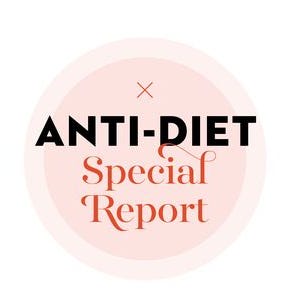
You know how little kids will open the fridge door and stare until someone tells them not to let all the cold out? Left to their own devices, they'll grab what looks good to them, eat enough so that they're no longer hungry, and then go back to dumping Legos on the floor for you to step on.
Young children have zero problem stopping mid-bite if they're full. They never choose blueberries when they really want pineapple, just because blueberries contain more antioxidants or have a lower glycemic index. They don't think, "I really shouldn't have this cookie because I colored instead of going to Tumbling Tots, so I didn't burn enough calories to earn it." They definitely don't eat to discomfort because their "eating window" closes at 7 p.m. sharp and they're not allowing themselves any more food until tomorrow at noon.
In the years before the world muscles its way in between them and their innate ability to eat according to what their bodies need, children's minds are simply thinking about what's available to them, what looks yummy and how hungry they are.
But, sooner or later, diet culture seeps into a child's consciousness and drowns out their instincts — and that's often when eating starts to become disordered.
What exactly is disordered eating?
Simply put, disordered eating is the extent to which you move away from listening to what your body is telling you to eat to nourish and care for yourself, both physically and emotionally, says psychologist Margo Maine, Ph.D., author of Pursuing Perfection: Eating Disorders, Body Myths and Women at Midlife and Beyond. Instead, you start eating according to external food and exercise rules — some you may not even realize you're following or rebelling against — sometimes to the point where the way you eat (or don't eat) gets in the way of your life.
To be clear, most of us eat in a disordered way. One survey found that some 75% American women engage in disordered eating behaviors, which makes it the norm in this country — and explains why many of us don't see it as disordered. "These women are all different ages, and we see it across the continuum of development," says Maine.
Disordered eating gets in the way of happiness and health, even if you don't have an eating disorder
"Normal" or not, this type of relationship with food is not exactly natural, in the sense of how nature intends us to eat. "Disordered eating is anything that disrupts a harmonious, body-connected eating experience," says Anna Sweeney, M.S., R.D., L.D.N., owner of Whole Life Nutrition Counseling in Concord, MA, where she helps people recover from eating disorders and disordered eating.
As a culture, we've zombie walked toward the consensus that trying to shrink our bodies or keep them small is obviously the right thing to do, which is why disordered eating is usually about attempts to live in a smaller body. But it isn't always about losing weight — for example, at the extreme, orthorexia is an eating disorder in which people become obsessed with the nutritional content of food and restrict accordingly, ostensibly for "health" reasons.
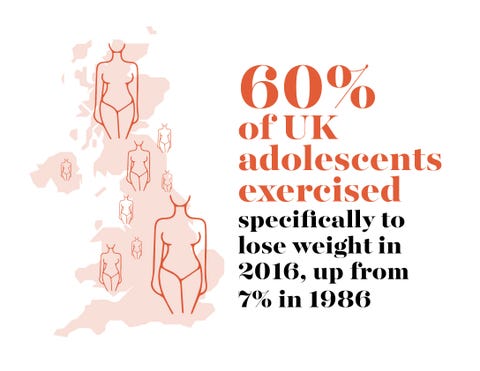
How does our eating get disordered?
Our eating can become disordered in thousands of ways, depending on the individual. Take the little kid in front of the fridge, for example: Maybe she enters kindergarten and the kid's parents (wanting to spare her being called "big Chloe" in her two-Chloe class) suggest that she skip the fries or dessert, and all of a sudden she feels shame around eating them. Maybe they decide the whole family is going to "get healthy" and make a big deal about what foods are "good" or "bad" and how much everyone should be eating. Maybe they keep only low-calorie snacks around, so "junk food" at a friend's becomes a "naughty" treat to be snuck.
When she's hungry at 10 a.m. and her teacher says lunchtime is at noon, she learns that there is a "right time" and a "wrong time" to eat that has nothing to do with what her body wants. Perhaps her ballet teacher taps her belly and tells her to pull it in, and she notices most of the girls on TV don't have visible bellies. She has a crap day and finds that eating makes her forget, and after a series of crap days, food becomes the main thing that helps. By the time she's a tween, she's conscious of how much she weighs relative to her friends, feels guilty when she eats "too much," and maybe has started to exercise to compensate, rather than because she likes sports or it makes her feel good. Social media and all the "perfect" bodies only make her more concerned about what she puts into her own.
Diet culture says our bodies are supposed to look the same throughout our lives. Newsflash: Nope.
The sum total of all this is that food has gradually stopped being fuel for her body and something to enjoy, and instead her eating is dictated by 7,000 "diet" rules she's absorbed, judgments about herself based on how well she follows these rules, and other ideas that have very little to do with giving herself what she wants and needs, food-wise, in that moment. And everywhere she looks, her disordered way of eating gets reinforced.
"We live in such an unhealthy food culture," says Maine. In addition to being surrounded by people who are preoccupied with their weight and body shape, "the constant cues about food from the media, the fast-food industry, the $70+ billion diet industry, and the round-the-clock availability of food, it gets us off of our centers," she says — making it very hard to eat according to what we actually need.
Are eating disorders different than disordered eating?
All eating disorders involve disordered eating, but not all disordered eating is extreme enough to be clinically diagnosed as an eating disorder. There is a spectrum, says Maine: On one end is eating intuitively without fear or judgment; on the other are eating disorders such as anorexia nervosa, bulimia nervosa, binge eating disorder, or some combination of all of them.
In between is the vast majority of us: The yo-yo dieters, the New Year's detoxers, or those of us who are unhappy about the way our bodies have changed after childbirth or menopause and are intermittently fasting, cutting whole categories of food or meal-replacing with some chalky powder in the hope that our bodies will revert to the way they looked in high school (when we also thought we were too fat). We are forever trying and failing to "improve" the way we eat to change or maintain the size of our bodies. In times of especially high stress, we do it even more.
But in some ways, the distinction between disordered eating and eating disorders is beside the point, says Maine. "Most people have subclinical eating disorders, and show a lot of eating disorder behaviors," she says. "It would be better if we could stop pathologizing it and just talk about what someone's relationship with food and their bodies means about a person's mental and physical wellbeing."
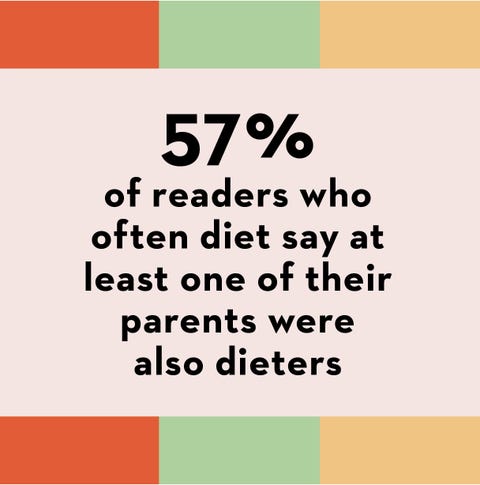
Signs you may be eating in a disordered way
The below are all warning signs and symptoms that you may not be eating according to what your body is asking for. Of course, everyone does some of these occasionally — it's hard to live in our world without resorting to what is convenient in the moment, so no judgment.
- You're eating to attempt to change your body size or shape. Does that mean all weight-loss diets are disordered eating? Sweeney says yes, while Maine sees diets as the first, dangerous step in that direction. "It's like a gateway drug. It's not safe at any speed," she says. "I do think dieting is an introduction to an eating disorder."
- You are following someone else's rules about food. Are you eating low-fat artificially sweetened yogurt because it's what you want, or because you've read that low-fat is healthy? Taking the bread off your sandwich because it's too much, or because carbs are not keto-friendly?
- You have a list of "good" and "bad" foods and eating behaviors in your head. "This is a step in the direction of disordered eating," says Maine. "You're giving the food a lot of power, by not letting yourself have it, and attributing things to the food that may be beyond the food's function." Thinking this way, says Maine, "sets you up for cravings, and cravings will set you up to overeat."
- You make food decisions based on the number on the scale. Or the number of net carbs, fiber or fat grams or calories in a food, or the number of steps you've taken on your pedometer, or minutes you held your plank. Or the number of inches your waist is, or the number indicating the size of your pants. These numbers came from diet culture, not your body's wisdom.
- You feel like you need to compensate for what you ate. For example, you had a big meal and dessert out with your friends, so you need to "do something to make up for it," such as restricting food or exercising in the future.
- You scold yourself for eating until you're full or past full. "Normal eating includes eating more than what you need sometimes, just because it's available and good, not because you're hungry," says Maine.
- You condemn yourself for eating in times of emotional need. "It's okay to eat to pleasure, and it's also ok to eat for comfort," says Maine. Sometimes mac and cheese for dinner can give you the warm, connected feeling you crave, and there's nothing wrong with that. Using food to abuse yourself — frantically eating giant amounts as a way to stop feeling scary or sad feelings, or as the only means to soothe yourself — is a sign of disordered eating.
- The way you eat gets in the way of socializing or working. Say, you avoid getting together for dinner or beg off a party in order to stick to your eating plan. When officemates invite you to lunch — great networking opportunity! — you decline so you can eat the portion-controlled food you brought from home.
- You eat according to a certain amount of exercise. Maybe you don't allow yourself to eat certain things or a certain volume of food if you haven't done something to burn calories that day, or, perhaps you avoid exercising because you find it makes you too hungry.
- You limit the number of hours that you allow yourself eat. Yep, that means intermittent fasting, too. If it requires you to ignore your hunger, it may be disordered.
But what if my diet plan or way of eating works for me?
The goal is to feel good about the way you eat and about your body. And because being thin or eating in a certain way has been conflated by diet culture with being "healthy" and having a "happy" life, dieting may feel like it's about trying to feel good and be in more in control, says Sweeney. "This is what diet culture plays to: How can I best take care of myself? It comes from a good place."
But for too many people, dieting and disordered eating results in the opposite of self-care. After a few days or months of feeling elated about a diet and its results, the whole experience winds up feeling more like self-punishment — especially when we "cheat." Only 2% of people labeled 'obese', according to research, ever get to a "normal" weight — and then the rest often blame themselves, instead of the fact that our bodies biologically resist attempts to lose weight through restriction. This setup for failure can make us unnecessarily miserable.
"There's such a tremendous diversity of humanity that we cannot imagine that all of us could eat the same way and have the same outcome," says Sabrina Strings, Ph.D., associate professor of sociology at the University of California at Irvine and author of Fearing the Black Body: The Racial Origins of Fat Phobia . "That's just genetics, environment, culture, body composition, all of these things impact how much a person needs to eat. I can no more tell you how many calories you should have than you could tell me, it doesn't make any sense. So why we should have one standard for all of humanity? It just boggles the mind."
This content is imported from {embed-name}. You may be able to find the same content in another format, or you may be able to find more information, at their web site.
I don't want to eat in a disordered way anymore. What can I do?
Lots of things. It's not easy to undo years or even decades of dieting and food rules, but even taking the first steps will be eye-opening and, hopefully, freeing.
✔️ Learn about intuitive eating and trusting your body. You can start by picking up a copy of Intuitive Eating: A Revolutionary Program that Works, which will help you start thinking about the truth of diet culture, healing your relationship with food, and how to give your body what it needs. "Being able to reacquire the skill of listening to your body is beautiful self-care," says Sweeney. If you notice that when you have a certain combination of food, it leaves you with energy that lasts for a period of time, that's listening to your innate body wisdom, she says. Over time — and it may take awhile after years of disordered eating — you'll learn what different foods work best for you at different times. "If you lean into trusting your body a little more, your body will show up."
✔️ Get pissed at diet culture. One thing that diet culture has normalized, says Sweeney, is the idea that our bodies are supposed to look the same throughout our lives. Newsflash: Nope. "We are not supposed to have an 18-year-old body in our mid-30s," says Sweeney, let alone in our 50s or beyond. "Women get this message that if you do this thing with food or movement, it's possible. For most humans it's just not." Once you realize how many untruths we've been fed, it's normal to be angry about it — and that's okay.
✔️ Rethink what "overweight" and "unhealthy" mean. You cannot know what someone should weigh by looking at them, just as you cannot tell if a person is healthy based solely on their weight. There are unhealthy thin people and healthy people in larger bodies. Instead of striving for a specific BMI, consider Maine's definition of the right weight for you: "Be sure you're getting adequate calories and nutrition every day, that you're not saying no to your hunger, and that you're getting reasonable exercise," she says. "If you do that for a while, that's where your weight is supposed to be." There, done.
✔️ Get professional support. Years of disordered eating or struggling with an eating disorder can be hard to unwind by yourself, especially in a culture that encourages disconnection from our bodies. If you suspect you have an eating disorder (or if you're not sure), look for a therapist who specializes in eating disorders. The National Eating Disorders Helpline is a good place to start. Another way to go is to work with a dietician who is certified in intuitive eating, who can help you learn to find your center when it comes to food and eating and consider working with a GP who has experience with larger bodies and isn't focused on weight loss. (Here's a great list of providers.)
Anyone feeling like they are suffering from disordered eating or an eating disorder can and should reach out for help immediately. The NEDA helpline at (800) 931-2237 is available daily via call or text, and officials also are on standby in digital chats, ready to help you find resources in your area. If you are concerned about a loved one, learn more about how you can help.
More From Our Anti Diet Series
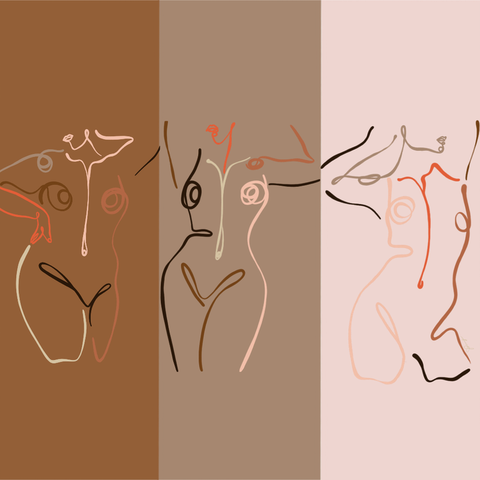
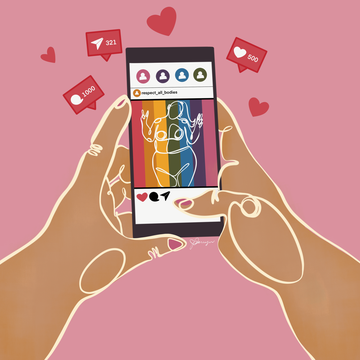
Body Positive Instagram Accounts to Follow Now
READ NOW
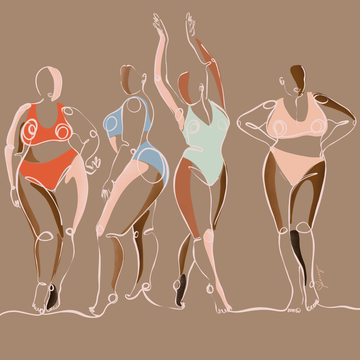
Why BMI Is Wrong for So Many People
READ NOW
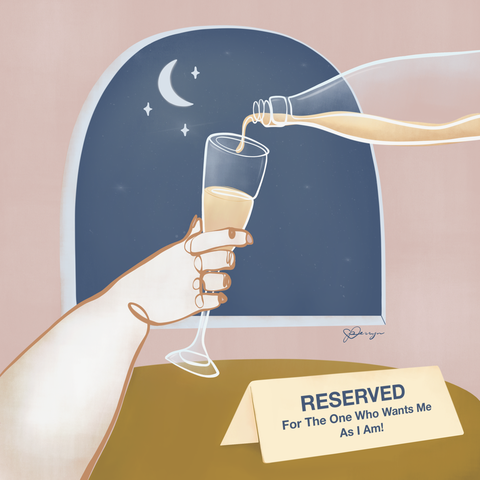
What It's Really Like to Date as a Fat Woman
READ NOW
Stephanie Dolgoff Deputy director, Health Newsroom, Hearst Lifestyle Group Stephanie, an award-winning journalist and New York Times bestselling author, has written and edited about health, fitness, and wellness for such publications as Good Housekeeping, Self, Glamour, Real Simple, Parenting, Cosmo and more.
This content is created and maintained by a third party, and imported onto this page to help users provide their email addresses. You may be able to find more information about this and similar content at piano.io
Eating Disorder Where You Lose Your Appitie or Feel Like Your Gonna Throw Up
Source: https://www.goodhousekeeping.com/health/diet-nutrition/a35036505/what-is-disordered-eating/
0 Response to "Eating Disorder Where You Lose Your Appitie or Feel Like Your Gonna Throw Up"
ارسال یک نظر